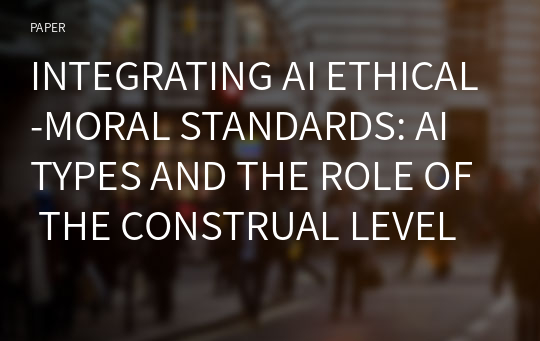INTEGRATING AI ETHICAL-MORAL STANDARDS: AI TYPES AND THE ROLE OF THE CONSTRUAL LEVEL OF ACCEPTANCE
* 본 문서는 배포용으로 복사 및 편집이 불가합니다.
서지정보
ㆍ발행기관 : 글로벌지식마케팅경영학회(GFMC)
ㆍ수록지정보 : Global Marketing Conference
ㆍ저자명 : Dan Jin, Heejin Lim
ㆍ저자명 : Dan Jin, Heejin Lim
영어 초록
The present study is designed to assess the ethical-moral effectiveness of three levels of AI implementations in the hospitality industry, which include mechanical AI for transactional services (automated service), thinking AI for functional services (algorithms search), and feeling AI for hedonic services (biometric sensors) when compared to consumers’ interactions with human. AI service robots are ethically challenging in use and morally controversial in its acceptance of labor replacement in hospitality contexts. In the hospitality industry, service robots have been rapidly adopted replacing frontline human services (Park et al., 2021). Service robots refer to “system-based autonomous and adaptable interfaces that interact, communicate and deliver service to an organization’s customers” (Wirtz et al., 2018, p.909). On the one hand, the applications of artificial intelligence (AI)-based service robots are promising in this field owing to remarkable accuracy in error reduction, portion control, and cost control in service operation and delivery (Berezina et al., 2019). However, on the other hand, there has been a debate on ethical and moral principles and values regarding service robots replacing human labor (Cowls et al., 2021). Nevertheless, restaurants’ adoption of service robots seems inevitable in the current marketplace as labor shortages and rising wages have challenged them to invest in automation (Tanzi, 2021). While prior research focused on the benefits of AI-based service offerings (e.g., Cristou et al., 2023; Huang & Rust, 2021; Park et al., 2021), this study explored the extent to which AI-based service robots are accepted by consumers without rising concern about service robots replacing human labors. To this end, we adopted Huang and Rust’s framework that identifies three levels of AI applications: mechanical, thinking, and feeling AIs. Mechanical AIs refer to the automation of repetitive and routine tasks (e.g., self-service technologies); thinking AIs facilitate rational decision-making based on data processing (e.g., conversational intelligent systems such as Siri); feeling AIs are able to interact with human emotions (e.g., humanlike robots that respond to human emotions such as Sophia). Further, we adopted the construal level theory (Trope & Liberman, 2003) to examine how different levels of AIs’ service capabilities influence the way that people think about AI-based service robots. In brief, this study demonstrated how different levels of AI benefits influence consumers’ moral concerns about AI-based service robotization’s replacement of human labor and social acceptance.참고 자료
없음"Global Marketing Conference"의 다른 논문
 THE ROLES OF GREEN PACKAGING IN UGLY FOOD PURCHASE INTE..22페이지
THE ROLES OF GREEN PACKAGING IN UGLY FOOD PURCHASE INTE..22페이지 THE IMPACT OF INDUCED AWE ON ETHICAL TOURIST BEHAVIORS5페이지
THE IMPACT OF INDUCED AWE ON ETHICAL TOURIST BEHAVIORS5페이지 A BIBLIOMETRIC ANALYSIS OF SPIRITUAL TOURISM RESEARCH15페이지
A BIBLIOMETRIC ANALYSIS OF SPIRITUAL TOURISM RESEARCH15페이지 SOCIAL NETWORK ANALYSIS AND RESPONSE TIME TESTING: CONS..11페이지
SOCIAL NETWORK ANALYSIS AND RESPONSE TIME TESTING: CONS..11페이지 THE EFFECTS OF PARA-SOCIAL INTERACTION ON ONLINE CELEBR..3페이지
THE EFFECTS OF PARA-SOCIAL INTERACTION ON ONLINE CELEBR..3페이지 THE INFLUENCE OF OPINION LEADERS ON DAILY DEALS USER’S ..3페이지
THE INFLUENCE OF OPINION LEADERS ON DAILY DEALS USER’S ..3페이지 HOW IMMERSIVE RETAILING AFFECTS CONSUMERS’ URGE TO BUY:..6페이지
HOW IMMERSIVE RETAILING AFFECTS CONSUMERS’ URGE TO BUY:..6페이지 KEY TO SUPERSTARDOM IN A GLOBALISED MARKET: THE ROLE OF..6페이지
KEY TO SUPERSTARDOM IN A GLOBALISED MARKET: THE ROLE OF..6페이지 A POST-PANDEMIC LOOK AT TOURISTS’ PERCEIVED COOLNESS OF..4페이지
A POST-PANDEMIC LOOK AT TOURISTS’ PERCEIVED COOLNESS OF..4페이지 EXTRACTING OFFLINE RETAIL SHOPPING PATTERNS: OLLABORATI..5페이지
EXTRACTING OFFLINE RETAIL SHOPPING PATTERNS: OLLABORATI..5페이지


























